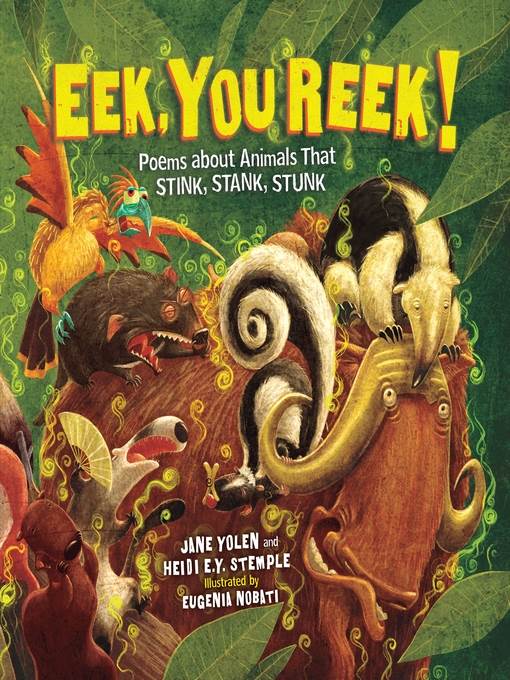
Eek, You Reek!
Poems about Animals That Stink, Stank, Stunk
کتاب های مرتبط
- اطلاعات
- نقد و بررسی
- دیدگاه کاربران
نقد و بررسی

August 1, 2019
What is that pong? These critters smell wrong! "Eek, you reek, / You made a funk. / Where you have been / Things stink, stank, stunk." Yolen and daughter Stemple (Monster Academy, 2018, etc.) team up again for a collection of poems that...um, celebrate those animals large and small that make the world a smellier place. The requisite skunk and stinkbug are joined by their lesser-known putrid pals. There are the stinkpot turtle, or Sternotherus odoratus ("There you are, oh odoratus, / With your musky turtle status. / Small mud-loving omnivore / That raccoons equally adore. / You pump out bad perfumes galore / When chased down by a predator"), and the hoatzin, a very smelly bird that digests like a cow and smells so foul no animal will eat it. A trio of haiku about icky insects adds to the fun (and info), as do longer poems on ferrets, musk oxen, wolverines, Tasmanian devils, and more. Nobati's green-tinged, digitally painted pencil drawings depict the reeking wretches and virtually make the stink visible. A paragraph of information on each creature graces the close, as does a glossary of smelly words and a fetid further reading list. The tone is fresh, however, and the foolish foulness may just hook those who think poetry stinks. Rancid rhymes and syncopated stank and plenty of eeeew just for you. (Informational picture book/poetry. 6-12)
COPYRIGHT(2019) Kirkus Reviews, ALL RIGHTS RESERVED.

October 18, 2019
Gr 2-5-With the exception of the opening and closing poems that address all of the stinky animals, each poem focuses on one animal that has a smelly trait or preys on a smelly animal. Tackling everything from well-known skunks and ferrets to the lesser-known hoatzin and tamandua, the poems address how the animal uses their smell to deter predators, protect their food or territory, or attract mates. Illustrations are a combination of pencil drawings with texture and digital painting, and they give a playful tone to the poems by showing odor clouds wafting from the offending animals. Authors include reasons the animals have a stench as well as information about each animal covered in the poems. VERDICT Highly recommended for school and public libraries. Both educational and hilarious, this fun book of poetry written by Yolen and Stemple will not only please language arts teachers but will appease science teachers.-Lia Carruthers, Gill St. Bernard's School, Gladstone, NJ
Copyright 2019 School Library Journal, LLC Used with permission.

October 15, 2019
Grades 3-6 Who knew there were so many colorful ways to describe stinky animals? In these amusing poems, Yolen and her daughter Stemple vividly describe a variety of animals that give off revolting smells. According to the bombardier beetle poem, "The stink it expels / Like a squirt of bug mace / Is a big, boiling blast / In the predator's face." A millipede haiku states, "This scared ball of bug / Sends you a cyanide gift / Smell my wrath and die." Other stars of the smelly show include, of course, the skunk, ferret, and stinkbug, but also less recognizable critters like the shore earwig, stinkpot turtle, and hoatzin. Nobati's big, bold, exaggerated illustrations make the fetid odors almost waft off the page. Back matter explains why these animals emit such awful smells, and offers facts about each animal, including smelly word glossaries and a "foul-scented" bibliography. Readers will be simultaneously laughing while they hold their noses through this fun read. The animals may stink, but the poetry certainly does not.(Reprinted with permission of Booklist, copyright 2019, American Library Association.)

























دیدگاه کاربران